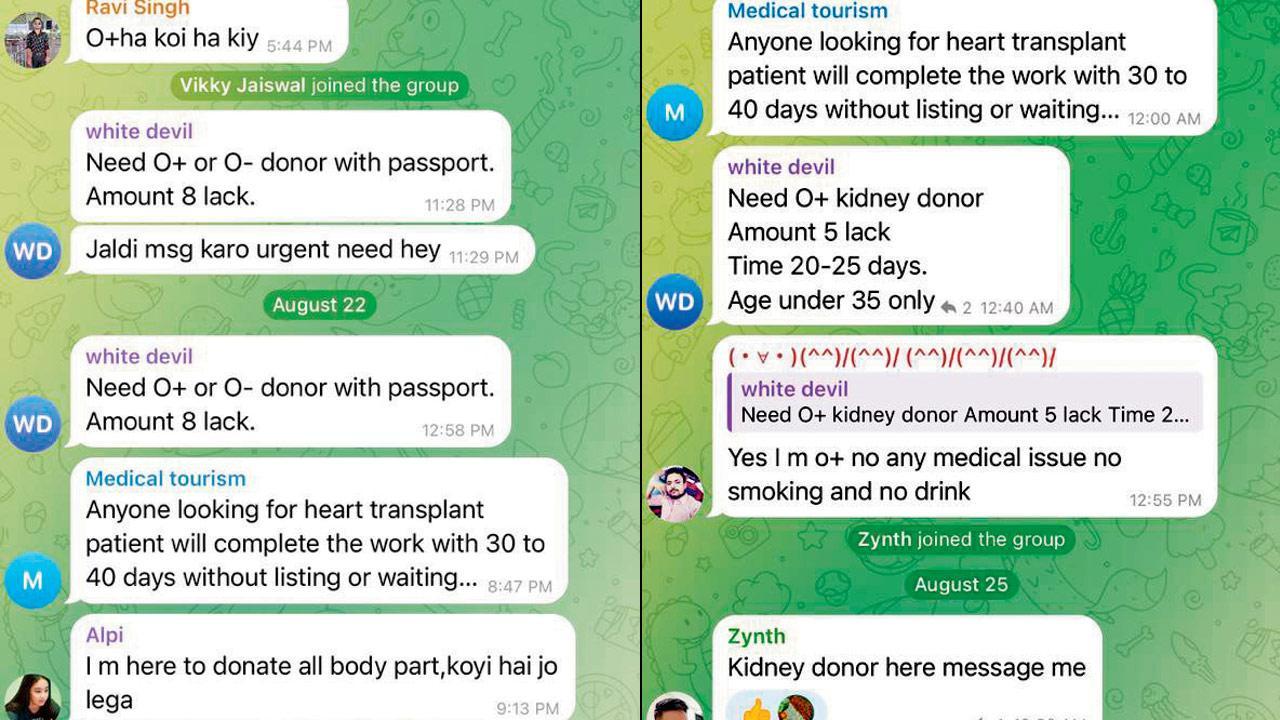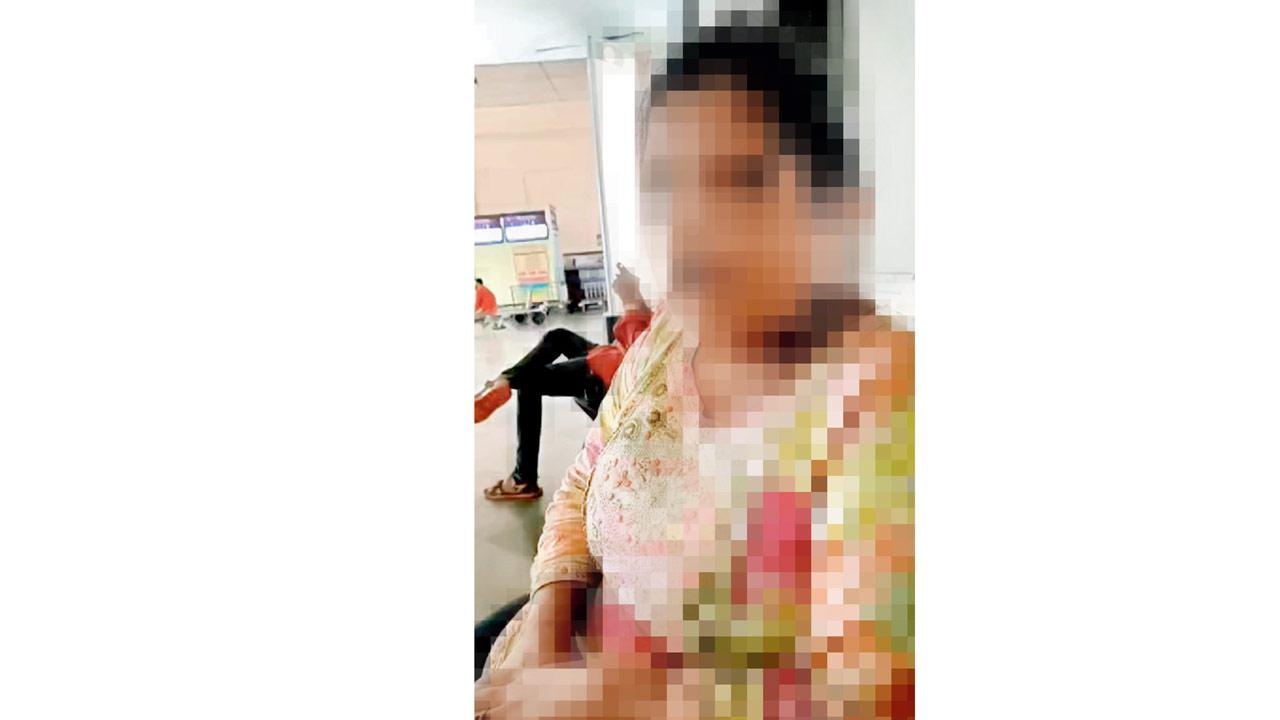Racketeers exploit identity crisis linked to tampered documents and post-surgery weakness, which renders physical labour impossible

Screenshots of a conversation in a Telegram group where agents and donors interact
 Illegal kidney donors, grappling with an identity crisis brought about by unauthorised changes to their Aadhaar cards and battling health issues, often find themselves with no choice but to work as agents for organ traders. Many of these donors, most of whom were impoverished to begin with, are left to struggle with depression, anxiety and post-traumatic stress disorder (PTSD) and the removal of their organ renders them unfit for work that fetches enough for two square meals a day, leaving them open to exploitation.
Illegal kidney donors, grappling with an identity crisis brought about by unauthorised changes to their Aadhaar cards and battling health issues, often find themselves with no choice but to work as agents for organ traders. Many of these donors, most of whom were impoverished to begin with, are left to struggle with depression, anxiety and post-traumatic stress disorder (PTSD) and the removal of their organ renders them unfit for work that fetches enough for two square meals a day, leaving them open to exploitation.
ADVERTISEMENT
mid-day learnt that illegal donors formed multiple channels and groups on Instagram and Facebook where they lure others to donate their kidneys. Each illegal donor-turned-agent is given Rs 50,000 as a commission for enticing a potential donor, one of them revealed, adding, “If such an individual is sent to a foreign country, they are given a commission of Rs 1 lakh; but they need to have a valid passport. The commission for fetching donors from a foreign country is transferred directly to the agent’s bank account.”
In the previous reports from the ongoing organ mafia series, mid-day exposed how criminals made unauthorised changes to the Aadhaar cards of illegal donors to allegedly facilitate surgeries at the Kolkata-based Apollo hospital.
Donors’ dilemmas
Since most illegal donors are unskilled labourers, security guards and daily-wage workers, they can’t afford to continue in these strenuous jobs. Additionally, a minimally educated illegal donor cannot consider applying for a new job, as the name and other details on their Aadhaar card are inconsistent with identity documents issued by the Government of India.

A woman who had no choice but turn agent for the racketeers after donating a kidney
“We are helpless! I’ve been weak since the surgery. I get anxiety attacks; above all, I had to bear the post-surgery medical expenditure. I had little money. What can I do?” an illegal kidney donor said. Another told mid-day, “I had donated a kidney to repay a loan but these people did not pay me the promised amount. Consequently, I had no option but to work as an agent for them to sort out my health issues and run my household.”
“I have become so weak that I can’t even lift a bucket of water. Also, it’s excruciating for me to climb staircases. Donating a kidney was the worst decision I took in my life but I was helpless as my parents back in my village were reeling under debt,” he added.
‘Not a simple scam’
The network of these organ traffickers is so complex and well-knit that only central agencies will be able to unravel the truth, said an illegal donor-turned-agent. “I work as an agent for this organ trafficking gang not by choice, but helplessness. They tricked me into this racket,” said a woman, who initially operated in Hyderabad but now has been working for the gang in Kolkata.
The illegal donors are familiar with each other as they were kept together at a secluded spot pending medical tests and alteration to their documents before surgery. “This familiarity helps us as we carry out work for the gang. Earlier, we didn’t have cash. But, today we get R50,000 for luring one kidney donor in India, and Rs 1 lakh for sending such donors to foreign countries,” said a donor-turned-agent.
mid-day’s undercover reporters, who infiltrated the organ trader gang by personating illegal donors, learnt that the crooks demand at least Rs 10,000 to restore the original identity of the donors’ Aadhaar card. The alleged mastermind Wasim Akram’s close confidant Heera, is a key figure in the organ trafficking gang. “After my identity was changed on my own Aadhaar card to facilitate the surgery at the hospital, I contacted
Heera to restore my identity. He demanded Rs 10,000 for this, but I don’t have that kind of money,” said an illegal donor, whose name, age and domicile were changed though his biometric details and unique number issued by the government were left untouched.
The modus operandi
The illegal donors-turned-agents have been tapping big cities such as Mumbai, Kolkata, Delhi, Hyderabad, Bengaluru and Jaipur. “They visit dialysis centres in their respective towns and cities to prepare a list of patients suffering from kidney disease,” said an illegal donor. “Later, these patients’ relatives are contacted. If the relatives agree to pay for a kidney, the medical files are shared with the agents, who post the blood groups on Telegram or Facebook,” said the donor.
“Those in urgent need of money fall into their traps and that’s how the game starts. If a person with the same blood group agrees to donate a kidney or other vital organs, the agents ask them to share their Aadhaar card and a photo,” he added. “There are many hospitals in India where the organ traffickers have joined hands to run this racket discreetly for a huge sum of money. An illegal kidney donor is paid barely paid Rs 4 lakh to Rs 5 lakh but his organ is sold for Rs 35 lakh to Rs 50 lakh. The profit is split among members of the organ mafia,” said another illegal donor.
 Subscribe today by clicking the link and stay updated with the latest news!" Click here!
Subscribe today by clicking the link and stay updated with the latest news!" Click here!







